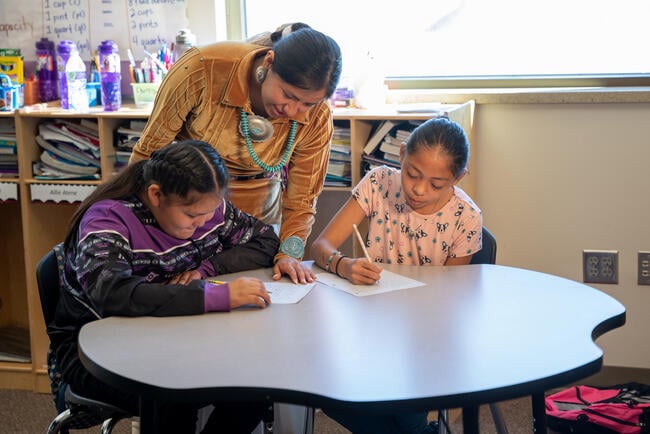You have /5 articles left.
Sign up for a free account or log in.

Education Department officials say they don’t consider teaching Native history a DEI issue, a welcome clarification to tribal schools and colleges.
grandriver/E+/Getty Images
In a recent letter, the Department of Education reassured tribal education leaders that Trump administration officials recognize the federal government’s trust and treaty obligations to tribes and won’t categorize Indigenous history as a banned DEI topic.
While the letter focuses on K-12 education, tribal college leaders and advocates believe it also bodes well for their institutions and Native American college students more broadly. But they want to see policy action follow the positive messaging.
The letter, sent in late April, came in response to concerns raised by the National Indian Education Association. The tribal education advocacy group sent a letter to department officials in January arguing that teaching Native history in public schools shouldn’t be considered a violation of “Ending Radical Indoctrination in K-12 Schooling,” an executive order that threatened to strip funds from programs and schools that teach “discriminatory equity ideology.” The group also pushed for “local control of education” and tribal representation on task forces that advise the president to ensure the government upholds its legal responsibilities related to Native American education.
Responding to the NIEA letter, Hayley B. Sanon, principal deputy assistant secretary and acting assistant secretary for the Office of Elementary and Secondary Education, said the department is committed to making “all education decision-making” local by “returning education to States and Tribes.”
“Further, it is the position of the Department that American Indian, Alaska Native, and Native Hawaiian history is not classified as diversity, equity, and inclusion (DEI) or critical race theory (CRT), and the Department will not treat Native history as DEI or CRT,” she wrote.
Sanon also acknowledged the “unique political and legal relationship with federally recognized Indian Tribes, as set forth in the Constitution of the United States, treaties, executive orders, and court decisions.”
Jason Dropik, executive director of the National Indian Education Association, wrote in a letter to the organization’s supporters that he appreciated department officials “affirming what Native communities have long known”: that Native American history isn’t DEI and “the Department’s programs and funding sources are essential components of the federal government’s trust and treaty obligations to Native education.”
Tempered Optimism
Though the letter pertained to a K-12 issue, tribal college leaders have been waiting to hear those words from Trump administration officials, especially after some of their grants were paused amid broader efforts to slash federal spending viewed as related to DEI.
For example, multiple tribal colleges, including Nueta Hidatsa Sahnish College in North Dakota and College of Menominee Nation in Wisconsin, had grants from the U.S. Department of Agriculture frozen earlier this year, halting some community-focused projects, staff positions, student scholarships and internships. Meanwhile, tribal leaders and their advocates have repeatedly sought to remind government officials that Native Americans are members of sovereign nations to which the American government has certain obligations.
“Tribes have raised concerns that Tribal programs may be misclassified as DEIA or [environmental justice],” Republican senator Lisa Murkowski, chair of the Senate Committee on Indian Affairs, wrote in a February letter to the Office of Management and Budget. “Any pauses or elimination of these programs would undermine the United States’ trust responsibility to Indian Tribes and their ability to provide services to their members.”
Cheryl Crazy Bull, president and CEO of the American Indian College Fund, said she’s pleased to see evidence that ED officials “either have or are developing an understanding” of tribal identity and “the treaty and trust relationship that Indian tribes have with the federal government.”
But she wants policy to reflect the department’s messaging.
“Will tribal curriculum, will K-12 teacher education, will programs that are aimed at providing support to Native students to overcome challenges that they’ve faced … will those continue? We don’t know that,” she said. “While I appreciate these statements, I think I’m watching to see, is funding intact?”
She especially wants to ensure that teacher training programs can continue to equip teachers to include Native history and culture in their K-12 classrooms. She said teaching Native history makes a difference for Indigenous students’ sense of belonging, which in turn improves their future academic outcomes in college.
“For a Native student to succeed, wherever they want to go to college, they need to have a lot of supports in place in order to navigate that,” she said. “And among those supports are seeing themselves in curriculum, seeing themselves in the pedagogy” in K-12 schools and higher ed institutions.
Twyla Baker, president of Nueta Hidatsa Sahnish College, described feeling “hopeful” but “cautious” about the signaling in the Education Department letter. Ideally, advocacy groups shouldn’t have to “write all these letters and hold the federal government’s feet to the fire in terms of upholding what they’ve agreed to with the trust and treaty obligations,” she said.
Nonetheless, she’s grateful groups pushed for and received confirmation that the Education Department recognizes tribes’ unique status. She hopes it will enable tribal colleges to continue their “dual missions”: providing “the standard academic and career training” but also “ensuring that our cultural life, ways, our languages, our histories, are recorded and revitalized.”
At least now it’s in writing, “very plainly in black and white” that Native education isn’t considered DEI, she added. And tribal education leaders can point to the letter and argue, “You have to continue to support tribal colleges, Indian education as a whole, and that means supporting our sovereignty as tribal nations to implement those things in the way that we see fit.”
Brad Hall, president of Blackfeet Community College in Montana, similarly said he was “pleased” but “hesitant to be that optimistic” about the letter and its implications. While it’s a “breath of fresh air” to know the department doesn’t consider tribal education DEI, he said, he also wants to see specific policy steps taken.
He pointed out that Trump revoked a Biden executive order to support tribal colleges on his first day in office; Hall wants to see it restored. He also said the Education Department, reeling from staff cuts, has been unable to offer much clarity on how much funding tribal colleges can expect to continue receiving, making it hard to plan ahead. Like other tribal colleges, Blackfeet relies heavily on the department’s Title III funding for all kinds of costs, including IT, marketing, institutional research and data.
Losing Title III funding would be a “dagger in our heart,” Hall said. More than anything, “we really want to make sure that our funding levels are going to be maintained.”





